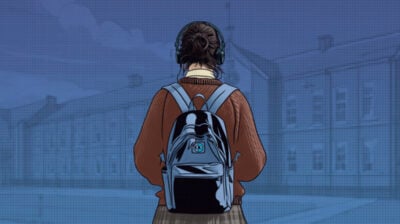Dealing with bereavement in college
Losing a loved one can be tough at any stage in life. Here, Conor shares his tips for how your college can help
Written by Conor Stitt
Voices - Advice
Young people share advice based on their experiences.

College can be a tough time and losing someone close to you can cause major distress to your life where confusion, frustration and a sense of loss thrives. This is a challenging time where our daily life doesn’t seem the same like your life is a jigsaw, an important piece has gone and you’re now left to wonder, how can I proceed? How will life proceed with the loss of this person who played such a role in my life? I was 20 years old when I lost my father suddenly. I was in the final year of my B.A. in NUI Galway, which I ended up having to repeat the year. It took a long time to get my life back on track or to even be interested in doing so, but I eventually regrew my determination to succeed and to achieve.
I was elected to my Students’ Union 18 months later and was then in a position to help students in similar situations. The most important thing I will stress from this article is, you will get through this. Here are some healthy tips on how to deal with bereavement in college:
Take Time
After the death of a loved one, what I can only describe is a mix of heartbreak, grief, numbness and confusion set in and it’s a time where we need to take stock and prioritise, while easier said than done, I can put it more simply: Your priority should be to take care of yourself. Your life has taken a major knock and you’re still dazed from it and your mental health can take much of this hit. Take stock, take some time out, be proactive with your own mental health, exercise, spend time with friends and loved ones, do what you love. There are plenty of articles on this website to help you with this. Your second priority should be to look out for those around you also affected by the loss. Whether it be family or friends, reaching out is of utmost importance. Many people can be affected by the loss of one person and a support network can help turn lives around from pits of grief and loss. The part you play in this support network, whether it is asking a friend or family member how they’re doing to spending a considerable amount of time with many friends or family members; it helps the person you’re giving a positive amount of energy to but also, helps you in being proactive in your life and probably having a person you can equally confide in as they can to you. When I say take time, take as much time as you need until you feel comfortable to restart certain aspects of your life again. Baby steps during the process are the bravest and will help you strive back to your life and to a positive and resilient frame of mind.
Returning to College
After a major loss, your studies can feel of significantly less importance but in truth, this is due to a negative impotence on your life and nobody (including yourself before the loss) wishes to see your studies negatively affected as a result. Returning to college, while you may not realise it, shows great bravery and resilience and is one of the first steps in getting your life back on track. Attending lectures, meeting friends and studying are daily tasks that you might not feel too bothered about at first but it does help you engage proactively and positively back into your life.
Reaching out
A step you should take is reaching out, and the sooner the better you do so, the more helpful it will be. Reaching out takes a number of forms of which I’ll detail below:
Talk to your Students’ Union: Your SU is an amazing resource that works for you and is there for you. You can talk to your SU and they’re there to help. They can provide a confidential listening and referral service and give you advice regarding finances and academics. The person you’ll meet has dealt with students suffering from bereavement before and can give a wealth of resources reengaging with college life. The SU can help, advise and represent you on any of the below points.
Tell your lecturers/course director: It’s very important you make them aware of your recent loss. A bereavement can affect your studies in a substantial way and the only way your college can accommodate this, is to make them aware. They can grant extensions to deadlines, give you due-consideration while marking exams and/or allow you to defer exams due to extenuating circumstances. If you have already taken exams or submitted assignments post-loss or during an illness, most colleges have appeals processes in place where you can request your exams be remarked with your circumstances taken into account.
Talk to college counsellors or chaplains: There are seven well know stages of grief and loss and for someone whose young and may never have experienced bereavement, it is a frightening time. The truth about reaching the final step: acceptance, is to talk and come to terms with the loss and come to that acceptance with those that can and are trained to help.
Plan your finances
In cases of the loss of a family member, especially a parent, there can be a significant loss of income to the family to which there will have to be some form of readjustment. If you’ve lost a parent, your surviving parent may be eligible for certain forms of financial support such a widow’s pension or a widowed parent’s grant.
If you have to pay fees, most colleges have some form of payment plans you can avail of, contact your fees office for info.
If you’re receiving the grant, it’s important you let your grant authority know of any change to your family’s income (Note: widow’s pension and widowed parent’s grant, at this moment, are taken into account as income), SUSI’s helpline can help you with accounting for your changes of circumstances.
If you’re repeating the year and pay fees, a repeat fee is applicable but some colleges will deduct this if you’ve been subject to extenuating circumstances e.g. bereavement, make sure to enquire with your fees office or SU if your college allows this. If you’re repeating the year and you’re on the grant, in certain extenuating circumstances, SUSI will award you a continuance of your grant, contact SUSI’s helpline for more information.
I believe with these steps, it can help you get through a very tough time and so many people and institutions are there to help, support and accommodate you. Most importantly, take your time, take care, stay safe and please talk.
Conor Stitt served as Vice President/Education Officer with NUI Galway Students’ Union in 2012/13 and Vice President for the Border, Midlands and Western Region with the USI.






